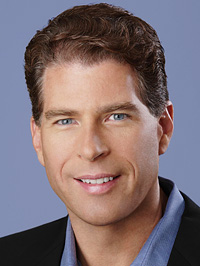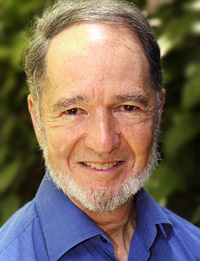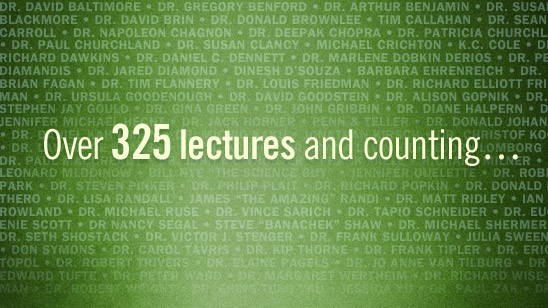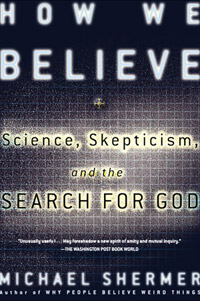In this week’s eSkeptic:
THIS SUNDAY: watch Dr. Paul Zak for free online, broadcast live from Caltech
New Admission Policy and Prices
Please note there are important policy and pricing changes for this season of lectures at Caltech. Please review these changes now.

The Moral Molecule:
The Source of Love & Prosperity
Sunday, December 16, 2012 at 2 pm
Baxter Lecture Hall
A revolution in the scientific study of good and evil, Dr. Paul Zak’s new book, The Moral Molecule, answers such questions as: Why do some people give freely while others are cold hearted? Why do some people cheat and steal while others you can trust with your life? Why are some husbands more faithful than others—and why do women tend to be more generous than men? Could the key to moral behavior lie with a single molecule? From the bucolic English countryside to the highlands of Papua New Guinea, from labs in Switzerland to his campus in Southern California, Dr. Zak recounts his extraordinary stories and sets out, for the first time, his revolutionary theory of moral behavior.
Followed by…

The World Until Yesterday:
What Can We Learn from Traditional Societies?
DR. JARED DIAMOND
SATURDAY, Jan. 5, 2013 at 2 pm
Beckman Auditorium
Mega-bestselling author of Guns, Germs, and Steel and Collapse, Dr. Jared Diamond surveys the differences between “traditional” societies and industrial or post-industrial societies, with an eye to the question: what can we learn from the former that can make the world we live in a better place for all of us?
Tickets: $10 Skeptics Society members/Caltech/JPL community; $15 everyone else. Tickets may be purchased in advance through the Caltech ticket office at 626-395-4652 or at the door. Ordering tickets ahead of time is strongly recommended. The Caltech ticket office asks that you do not leave a message. Instead call between 12:00 and 5:00 Monday through Friday.
CALTECH LECTURE SERIES FLYER CORRECTION
In the flyer that went out in the mail announcing our Fall 2012 lecture series events at Caltech, this Jared Diamond lecture mistakenly read Sunday January 5. It should have read SATURDAY, January 5.


Interview with Kristine Duehl
SKEPTICALITY EPISODE 197
Have you ever paid much attention to the imagery depicted on children’s clothing, books and toys? After having a child of her own, it became obvious to our guest this week. In this episode of Skepticality, Derek interviews budding biologist Kristine Duehl, PhD (Biology), whose work focuses on flora and fauna and the biomes in which they live. Her goal is to educate parents and teachers, and to ensure that children are taught scientifically accurate information.
Get the Skepticality Podcast App
for Apple and Android Devices!
Get the Skepticality App — the Official Podcast App of Skeptic Magazine and the Skeptics Society, so you can enjoy your science fix and engaging interviews on the go! Available for Android, iPhone, iPad, and iPod Touch. Skepticality was the 2007 Parsec Award winner for Best “Speculative Fiction News” Podcast.
About this week’s eSkeptic
In an article entitled “Nontheism and Feminism: Why the Disconnect?” in the latest issue of Free Inquiry magazine, author and journalist Ophelia Benson targets Michael Shermer as the embodiment of misogyny. In this week’s eSkeptic, Michael Shermer publicly responds to Ophelia Benson.
Feminism Disconnected
A Response to Ophelia Benson
and a Caution on Tribalism in Secularism
by Michael Shermer
I In her article on “Nontheism and Feminism: Why the Disconnect?” in the latest issue of Free Inquiry magazine, the author and journalist Ophelia Benson writes that “atheism hasn’t always been very welcoming to women.” Why? Because, Benson believes: “The main stereotype in play, let’s face it, is that women are too stupid to do nontheism. Unbelieving in God is thinky work, and women don’t do thinky, because ‘that’s a guy thing.’”
Who in their wrong mind would believe such rubbish? According to Benson, me! Her evidence that I believe women are too stupid to do nontheism is a single 10-second sentence I uttered during a wide-ranging hour-long panel discussion on an Online talk-show called The Point, hosted by the Huffington Post chief science correspondent Cara Santa Maria, who invited me and two other men (Sean Carroll and Edward Falzon) to be on the panel to discuss atheism. In a Q&A that followed the main discussion, one viewer (a man) asked: “Why isn’t the gender split closer to 50/50 as it should be?” Benson then quotes me: “It’s who wants to stand up and talk about it, go on shows about it, go to conferences and speak about it, who’s intellectually active about it; you know, it’s more of a guy thing” (at the 12 minute mark.
First of all, Benson shortened the quote. What I prefaced the above with is: “I think it probably really is 50/50.” Benson also left out my follow up comment moments later that at the 2012 TAM (The Amazing Meeting) conference of skeptics and atheists, there were more women speakers than men speakers. I misspoke slightly. According to D. J. Grothe, the TAM organizer, there were an equal number of men and women speakers (the roster on the web page is incorrect) until, ironically, Ophelia Benson herself dropped out. As for the sex ratio of attendees, there were 40% women in 2011 and 31% in 2012, the shift, Grothe speculated online, possibly due to some of these very same secular feminists irresponsibly blogging about how skeptic or atheist events were not safe for women.
In any case, please read my answer again. Where do I say or even imply that women are, in Benson’s characterization of what I said, “too stupid to do nontheism” or that “unbelieving in God is thinky work and women don’t do thinky?” Clearly that is not what I said, as punctuated by my preface that I believe the actual sex ratio is 50/50. And for the record I don’t believe for a moment that women are not smart enough to do nonbelief thinking, or any other type of cognition for that matter.
A Secular Malleus Maleficarum
I would like to use this opportunity to address a larger issue at hand, starting with another important point that Benson also failed to mention, and that is Cara Santa Maria’s own comment that she made after reading the viewer question and before I answered: “In putting together this panel I had a hellova time finding a woman who would be willing to sit on the panel with me to discuss her atheism. Why is that?”
Yes, why is that? From a social scientist’s perspective (instead of a one-off comment on a TV show), I don’t know. The only way to find out is to conduct a scientific study through a carefully constructed survey instrument that is reliable and valid and administered to an adequate sample size controlled for intervening variables that could bias the results. Until such a study is made, all of us are just speculating. I asked Cara if she had given the matter any further thought, and this is what she wrote me in an email (12-09-12):
“In my search for panelists on the show, I did reach out to a couple of high-profile female atheists local to Los Angeles, but none were available to join. We did receive a video comment from AJ Johnson, the Director of Development at American Atheists.
I don’t know why there seem to be more men in secular circles than women, or whether there truly are more men than women who proudly bear the atheist label. I do find that I get a lot of feedback from readers/viewers commending me on my ‘bravery’ for speaking up as a female atheist. I’m not sure why I’m perceived as being any more brave than a man in doing so.
What I can say is whether it’s real or perceived, a gender bias does seem to exist in atheist/secular/human circles, but I’ve never known my friend and colleague Michael Shermer to contribute to this problem. He is, in my estimation, as pro-woman and pro-atheism as they come.” [This final comment was unsolicited and I considered redacting it, but just in case there remains any doubt in the matter….]
Part of the problem generated by such questions is that they force the mind into searching for plausible causes to that particular issue, and since the mind abhors a vacuum we concoct ad-hoc explanations on the fly, ignoring the possibility that such differences may be due to chance or some other reason. It also narrows the frame of the issue in a particular way that focuses the mind to think about that and not something else. For example, had Free Inquiry hosted a special issue on why socio-economic classes are not proportionally represented in the atheist movement, we would have heard a plethora of plausible explanations (e.g., rich people don’t like atheism because religion—at least the prosperity gospel type—reinforces their wealth as deserved; or poor people reject atheism because religion serves them well; or whatever). The point is that there is a built-in cognitive bias simply in asking the question, and we should be cognizant of how that narrows our thinking and frames our answers.
As well, we should all remind ourselves to be cautious of the confirmation bias, in which we look for and find confirming evidence for what we believe and ignore disconfirming evidence. This can lead to anything from the blatant misreading of quotes to full-on accusations of misthought or misbehavior. We must remember that we are all subject to the same cognitive biases as those whom we criticize in religious and paranormal cohorts, and keep in mind that in journalism, as in science and all rational inquiry, there is an ethic of going to the primary source, and especially giving the person in question the benefit of the doubt. In this case, a simple email asking what I meant would have cleared up any misunderstanding. (Skeptical Inquirer columnist Kenneth Krause did just that after reading Benson’s article, and that removed any doubt for him as to my position.)
As well, as in witch hunts of centuries past, we should be cautious of making charges against others because of the near impossibility of denial or explanation after the accusation. (Just read the comments about me in the forum section of Benson’s blog, where I’m called a “jackass,” a “damn fool,” and other descriptors that have become commonplace in the invectosphere. Is there anything I could say that would not confirm readers’ beliefs? Denial is what true witches (and bigots, racists, and misogynists) do. Many other examples abound. Harriet Hall, M.D., the SkepDoc columnist for Skeptic magazine (one of two women columnists of our three, I might add, the other being Karen Stollznow), who lived through and helped bring about the first-wave feminist movement, told me she “was vilified on Ophelia’s blog for not following a certain kind of feminist party line of how a feminist should act and think. And I was attacked there in a disturbingly irrational, nonskeptical way.” I asked her why she didn’t defend herself. She wrote in an email (12/08/12):
“I did not dare try to explain my thinking on Ophelia’s blog, because it was apparent from the tone of the comments that anything I might say would be misinterpreted and twisted to use against me. I have always been a feminist but I have my own style of feminism. And I have felt more oppressed by these sort of feminists than by men, and far less welcome in that strain of feminism than in the atheist or skeptical communities.”
In her article Benson mentions “implicit assumptions” in stereotypes. This refers to a body of research in cognitive psychology that shows how so many of our beliefs and attitudes are unconscious (Google “Implicit Association Test”). This is a fascinating and revealing line of inquiry, but what concerns me is how this research can become the perfect tool of the inquisitor, a chapter in a secular Malleus Maleficarum: Witches (alleged bigots, racists, and misogynists today) don’t even know that they’re witches (bigots, racists, misogynists) because it is subconscious. You may deny you’re a witch (bigot, racist, misogynist) because you don’t even know you are one. Once charged, twice accused, thrice convicted.
On Tribalism in Secularism
For all I know there may very well be stereotyping still going on in secular circles, but here I would like to challenge the assumption that a sex ratio other than 50/50 is evidence of misogyny. It isn’t. As Harriet Hall observed:
“I think it is unreasonable to expect that equal numbers of men and women will be attracted to every sphere of human endeavor. Science has shown that real differences exist. We should level the playing field and ensure there are no preventable obstacles, then let the chips fall where they may.”
Perhaps unintentionally, Benson makes a strong case that something other than misogyny may be at work here, when she asks rhetorically if I would make the same argument about race. I would, yes, because I do not believe that the fact that the secular community does not contain the precise percentage of blacks, Latinos, Asians, and Native Americans as in the general population, means that all of us in the secular community are racists, explicitly or implicitly. A variance from perfect demographic symmetry does not necessarily correspond to racist attitudes. It just means that the world is not perfectly divided up according to population demographics, and people have different interests and causes. There is nothing inherently bigoted, racist, or misogynistic in the fact that the demographics of the secular community do not reflect those of the general population (in gender, in age and socio-economic class, or in height, weight, or any number of other variables for that matter), so short of some other evidence of bigotry, racism, and misogyny, there is no need to go in search of demons to exorcise.
Finally, there is a deeper problem here that I have observed over the past several years that I would like to address to the larger secular community, and that is the dangers of in-group fighting and inquisition purges of those who are not “pure” enough in their atheism, skepticism, or humanism. My partner and co-founder of the Skeptics Society and Skeptic magazine, Pat Linse, was involved in the first wave feminism of the 1960s, and she recalls the lamentable in-group bickering about who were the “true feminists,” and how this led to witch hunts and purges that splintered the movement and made it a less effective political force.
I suspect such purging comes with the territory of the sociology and psychology of social and political movements. Several years ago I gave the keynote address at a national atheist conference. After, my host informed me that there was much squabbling among board members about whether or not I should be allowed to speak because it was not clear if I was “atheist enough” for their members, and especially because I had called myself an agnostic in my book How We Believe. (I simply clarified the difference between the ontological question of God’s existence—for which I endorsed the agnostic position of Thomas Huxley when he coined the word in 1869 as meaning “unknowable”—and the belief question of God’s existence, for which I call myself an atheist.)
Given this tribal propensity in human nature to divide people into In-Group/Out-Group and Us v. Them cohorts, we would be wise to not let our various affiliated movements (skeptical, atheist, humanist) be rent asunder. As Ben Franklin admonished his fellow freedom fighters, “we must all hang together, or assuredly we shall all hang separately.” There is still very real discrimination to be combatted in our society, with gays and atheists as two of the last minority groups to be targeted. Recent polls show that we are in the midst of a transformation in social acceptance of gay marriage (with the Supreme Court about to take up the issue), and as I have been predicting for years, in a few decades people will look back at this time with the same shame that we do today in recalling the Black and White drinking fountains and restrooms of the 1950s (my other prediction—Christians will take credit for bringing about the gay marriage revolution by citing some Episcopalian ministers who spoke out in favor of it).
As for the sex ratio of secular organizations, when I got into the skeptical, atheist, and secular movements in the 1980s, the conferences and meetings were mostly populated by, as Carl Sagan once described it, grumpy old white guys complaining about irrationality in the world. (Although, he added, there is much to complain about!) Since that time many of us have worked diligently to bring the membership and attendance rolls more in balance, not only in terms of gender, but race and age as well. We’re not there yet, but much progress has been made. I give dozens of public talks a year all over the country, and in every one of them when I look out I see not an audience of grumpy old white guys; I see a plethora of women, minorities, and people of all ages (although everyone still likes to complain about irrationality in the world!)
So we should hang together in our fight against real discrimination, bigotry, racism, misogyny, and homophobia wherever we find it. But instead of looking for demons and finding the witch’s mark of Satan in secular inquisitions, let us note the advancements we have made and celebrate that our movement is making real moral progress in attenuating our inner demons and accentuating the better angels of our nature through science and reason. ![]()













